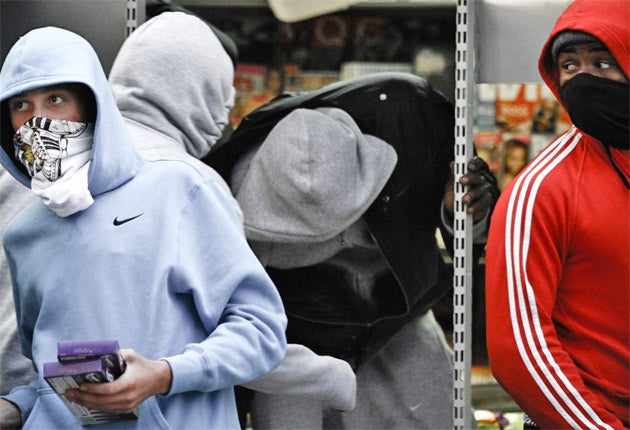How gangs have taken the place of parents in urban ghettoes
Ian Burrell explores the backgrounds of the London rioters

When a 26-year-old man became the first fatality of the riots yesterday, dying in hospital after he was shot in a car in Croydon the night before, it was a sad testament to the violence at the heart of the riots that have swept across London. But the incident also spoke to a deeper problem: the gang culture that suffuses the capital and seems to be a factor in the ongoing anarchy.
The man had been shot after he and a group of friends had got into a row with another group, an altercation that ended in a car chase and the shooting. That incident appeared to have been the result of a long-standing rivalry.
The complexity of London's gang culture was further revealed by reports that warped appeals for gang unity had been taking effect, with hastily made alliances between the criminal groupings said to have been set up before Monday evening's looting in Clapham. One constant throughout was surely hatred of the police. On one British "urban video" website, sympathisers with those in gangs gathered to discuss the burning and looting that had taken place in Tottenham on Saturday.
Some voiced concern that the gangs were not sufficiently co-ordinated in their attacks on police: "I would love it if every click [clique] from north, south, east turned on feds am telling you a lot of fed man will quit their job. This should be the new wave f**k this click on click beef its (sic) pointless."
Other contributors to the Spiff TV site were more graphic: "Man got duppied (killed) and all these north London dons are just doing is dashing rocks, burning shops and buses. Instead of them to try kill some of the fed man."
Such is the bloody and perverse world of Britain's gang culture, where a code of the streets is ruthlessly enforced but nobody really seems to know the rules. "They are not organised criminal enterprises, they are mercurial and chaotic bodies," said John Heale, author of One Blood, a study of British street gangs.
It is a culture that has spread through Britain like a virus over the past 20 years. According to research by Scotland Yard's Specialist Crime Directorate in 2007, London has 257 street gangs. Senior police officers, former gang members, frontline workers and academics are due to meet in London at the end of next month for Britain's third annual conference on Tackling Gangs and Serious Youth Violence.
Although gangsterism is still very much a minority activity, more young people are being drawn into a minor affiliation, even those who do not take part in crime. The geographical (often postcode-based) identities of the gangs put an onus on all young men from a neighbourhood to show their allegiance, or risk being victimised. According to Mr Heale, the rise of social media in the past decade has made it harder for youths to keep their distance.
Gangs quickly splinter or form alliances, creating a world that even those adults living in the midst of such activity find almost impossible to decipher. In Tottenham, for example, the NPK gang (which wears purple colours) competes for territory with the likes of Broadwater Farm (red), Chestnut (black) and Tiverton Piru (also red). Teenagers who live in a certain postcode find themselves as targets even on a short bus journey and may be terrified of wearing the wrong colour clothing in the wrong area.
In Birmingham, a dispute between two criminal groups a decade ago was defined by the media in territorial terms and the idea of a turf war quickly became accepted as fact, meaning that schoolboys started to declare allegiance to the Johnson gang or the Burger Bar crew, according to where they lived. The 2007 murder of 11-year-old Rhys Jones in Liverpool uncovered a street gang culture in that city, where one group marked itself out by wearing Lowe Alpine ski wear.
Many youths are drawn to gangs not by the need for protection but by the supposed glamour of a lifestyle that is celebrated in many areas of modern culture. The growing acceptance of this culture has helped create cases such as Alex Mulumba, a 15-year-old who was stabbed to death in 2006, leaving his father to say that his boy, apparently a diligent student, had "wanted to go to college and do electrical engineering". A Facebook image later emerged of Alex, who was known to his south London crew as Tiny Alien, wearing a mask gangster-style and aiming a shotgun. Mr Heale said that poverty was not a pre-requisite of gang activity.
As the gangs have managed to convince local youths that they somehow represent whole neighbourhoods – rather than simply their personal financial interests – police have struggled to overturn a wider perception that they are somehow the enemy.
Against this background, the riots have occurred. Although it is impossible to pinpoint the direct involvement of hardened street gangsters, it is clear that the disturbances have thrived on sympathy for the outlaw lifestyle among their juniors, the "youngers" to use the street argot. Tottenham, Hackney and Peckham – where some of the worst rioting has taken place – are areas of some of the highest gang activity in Britain. And so, after several years of rising gang violence where rival crews targeted each other, the gangs have turned on the propertied classes.
It can hardly be a surprise. Barbara Wilding, one of Britain's most senior police officers, highlighted the dangers at a speech at London's Centre for Crime and Justice Studies in 2008. "In many of our larger cities, in areas of extreme deprivation, there are almost feral groups of very angry young people," she said, presciently. "Tribal loyalty has replaced family loyalty and gang culture based on violence and drugs is a way of life."